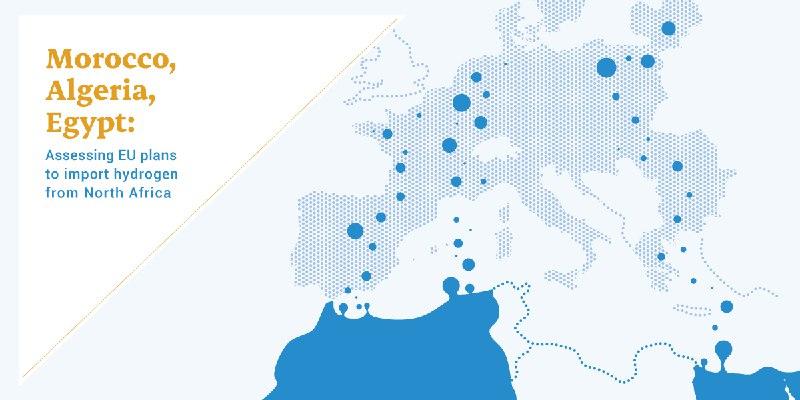
EU plan to increase renewable hydrogen use is unrealistic and will damage North Africa
On the eve of the launch of RePowerEU, a new report commissioned by lobby watchdog Corporate Europe Observatory (CEO) and Transnational Institute (TNI) has found that the EU’s plan to drastically increase the use of renewable hydrogen (H2) is not realistic, and will hurt North African countries' economy.
The study - which focuses on Morocco, Algeria and Egypt, as the majority of H2 imports will come from the Southern Mediterranean - estimates that production costs will make renewable hydrogen up to 11 times more expensive than natural gas. And that’s before transport costs are even factored in.
These vast costs make for unrealistic targets even if the EU is prepared to pay the difference, and these unrealistic targets are being used by Big Oil and Gas to sneak hydrogen from natural gas through the back door. This means they can keep drilling and selling their main product.
Producing expensive renewable hydrogen for export is a huge waste of the clean energy of North African countries which could, instead, be going towards local development and helping meet their own climate targets.
The EU should immediately revise its hydrogen strategy, scrap its unrealistic import targets and vastly increase investment in energy efficiency and renewables to reduce dependency on gas.
Pascoe Sabido, Researcher and Campaigner at Corporate Europe Observatory (CEO), said:
“It’s outrageous that the EU has set such unrealistic and expensive targets: who is expected to pay for this? The taxpayer? Bills are already soaring amidst a devastating cost-of-living crisis and, as usual, the poorest will suffer the most. The money would be better used to insulate homes.
“Whilst the EU is in bed with the gas industry and big corporations, who are steering the continent’s response to the energy crisis, it’s ordinary citizens in Europe and North Africa who will bear the brunt of this deeply flawed hydrogen strategy.”
Dr Hamza Hamouchene, the North Africa Programme Coordinator at the Transnational Institute (TNI) said:
"It is becoming very clear that most of the green hydrogen that the EU would like to use in its green transition in the coming years will be imported and coming from regions such as North Africa.
This study raises important points about the cost-effectiveness of producing and transporting green hydrogen from countries like Algeria, Egypt and Morocco. But what we also should be asking is who is going to foot the bill?
And will these export-oriented projects benefit North African populations in terms of their own energetic transitions, jobs, economic integration and technology transfer? What about the environmental impacts around water and land usage? More often than not, such projects end up perpetuating resource grabs and neocolonial relations."
ENDS
Notes to editors:
- The leaked RePower EU “External Energy Strategy”, seen by CEO, says the EU will import 10 million tonnes of renewable hydrogen with 6-8 million coming from the Southern Mediterranean.
- The study is written by Michael Barnard, Chief Strategist at TFIE Strategy Inc.
- Eni’s planned 1 GW green hydrogen solar plant in Algeria is predicted to produce hydrogen costs at $4.40/kg, which is 11 times the cost of using natural gas in Europe per unit of energy, calculated using TTF prices before the winter energy crisis and the invasion of Ukraine. Based on today’s prices, it would still be three times more per unit of energy.
- Italian oil and gas giant Eni has signed agreements with Egypt and Algeria to explore ‘blue’ hydrogen (from gas with CCS), a technology also supported by the External Energy Strategy. Blue hydrogen can produce up to 12 tonnes of emissions for every tonne of hydrogen. As both are oil producing countries, the captured CO2 is likely to be used for enhanced oil recovery.
- The Strategy also outlines increasing natural gas imports from Algeria and Egypt, making this a far more likely export commodity than green or blue hydrogen.
- Instead of using their renewables to manufacture expensive renewables hydrogen for export to Europe so the EU can meet its climate targets, the green electricity to displace fossil fuel generation and meet the existing renewable energy targets of Morocco (Morocco, 52% by 2030), Algeria (27% by 2030) and Egypt (42% by 2035). This green energy could help meet local energy needs and should be supported by EU climate finance.
